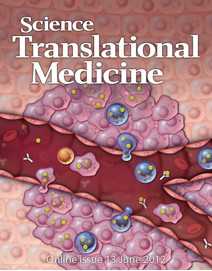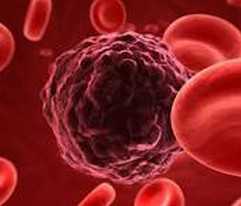Sci Transl Med:I型糖尿病令心肌梗死恶化
2012-06-17 EurekAlert! EurekAlert!
I型糖尿病患者会在心肌梗塞之后出现严重的炎症,这使得这些病人发生死亡及其它并发症的风险增高。 一项刊登在杂志Science Translational Medicine上的研究指出,在小鼠中做的新的研究报告说,这一炎症看来是由免疫细胞攻击受损伤的心脏而引起的。这些发现可帮助研究人员准确地找到用于诊断或减轻心脏炎症的新的标靶。Raju Gottumukkala及其同事发现,在某次心肌梗塞之后,患有
I型糖尿病患者会在心肌梗塞之后出现严重的炎症,这使得这些病人发生死亡及其它并发症的风险增高。
一项刊登在杂志Science Translational Medicine上的研究指出,在小鼠中做的新的研究报告说,这一炎症看来是由免疫细胞攻击受损伤的心脏而引起的。这些发现可帮助研究人员准确地找到用于诊断或减轻心脏炎症的新的标靶。Raju Gottumukkala及其同事发现,在某次心肌梗塞之后,患有糖尿病的小鼠会产生特异性地攻击心脏细胞并在心肌中促发炎症的自身抗体。
研究人员在观察一小组经历过心肌梗塞的I型糖尿病患者时发现,83%的病人的心脏组织中有这些抗体。这些数据表明,自身免疫疾病,如I型糖尿病,会令心肌梗塞的后果恶化。一则有关的《焦点》文章解释了这些发现。

doi:10.1126/scitranslmed.3003551
PMC:
PMID:
Myocardial Infarction Triggers Chronic Cardiac Autoimmunity in Type 1 Diabetes
Raju V. S. R. K. Gottumukkala1,*, HuiJuan Lv1,*, Lizbeth Cornivelli1, Amy J. Wagers1,2,3, Raymond Y. Kwong4, Roderick Bronson5, Garrick C. Stewart4, P. Christian Schulze4,6, William Chutkow4, Howard A. Wolpert1, Richard T. Lee3,4 and Myra A. Lipes1,†
Patients with type 1 diabetes (T1D) suffer excessive morbidity and mortality after myocardial infarction (MI) that is not fully explained by the metabolic effects of diabetes. Acute MI is known to trigger a profound innate inflammatory response with influx of mononuclear cells and production of proinflammatory cytokines that are crucial for cardiac repair. We hypothesized that these same pathways might exert “adjuvant effects” and induce pathological responses in autoimmune-prone T1D hosts. Here, we show that experimental MI in nonobese diabetic mice, but not in control C57BL/6 mice, results in a severe post-infarction autoimmune (PIA) syndrome characterized by destructive lymphocytic infiltrates in the myocardium, infarct expansion, sustained cardiac autoantibody production, and T helper type 1 effector cell responses against cardiac (α-)myosin. PIA was prevented by inducing tolerance to α-myosin, demonstrating that immune responses to cardiac myosin are essential for this disease process. Extending these findings to humans, we developed a panel of immunoassays for cardiac autoantibody detection and found autoantibody positivity in 83% post-MI T1D patients. We further identified shared cardiac myosin autoantibody signatures between post-MI T1D patients and nondiabetic patients with myocarditis, which were absent in post-MI type 2 diabetic patients, and confirmed the presence of myocarditis in T1D by cardiac magnetic resonance imaging techniques. These data provide experimental and clinical evidence for a distinct post-MI autoimmune syndrome in T1D. Our findings suggest that PIA may contribute to worsened post-MI outcomes in T1D and highlight a role for antigen-specific immunointervention to selectively block this pathway.
本网站所有内容来源注明为“梅斯医学”或“MedSci原创”的文字、图片和音视频资料,版权均属于梅斯医学所有。非经授权,任何媒体、网站或个人不得转载,授权转载时须注明来源为“梅斯医学”。其它来源的文章系转载文章,或“梅斯号”自媒体发布的文章,仅系出于传递更多信息之目的,本站仅负责审核内容合规,其内容不代表本站立场,本站不负责内容的准确性和版权。如果存在侵权、或不希望被转载的媒体或个人可与我们联系,我们将立即进行删除处理。
在此留言










#TRA#
0
#Transl#
76
#Med#
71